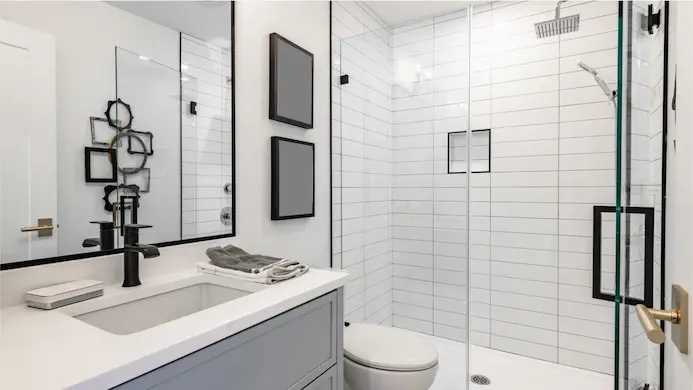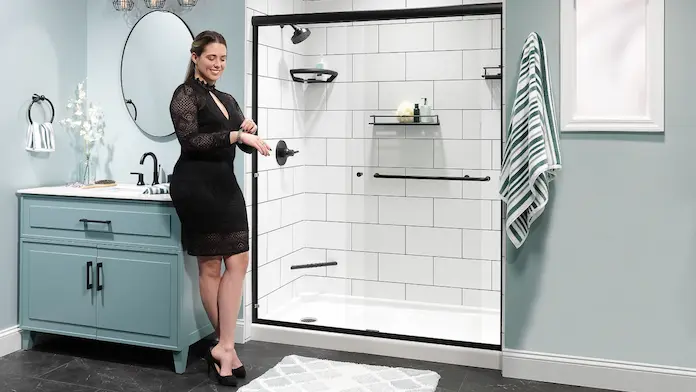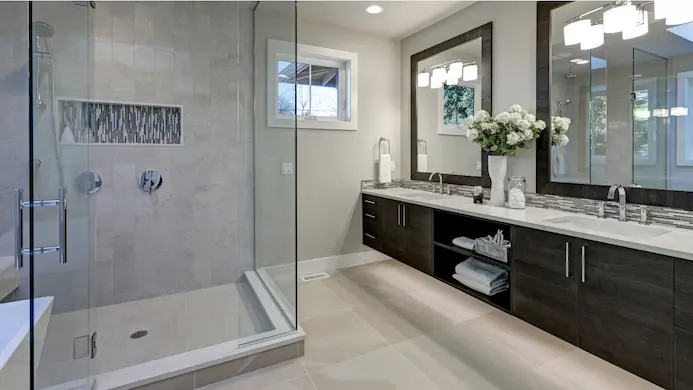How Much Does a Tub-to-Shower Conversion Cost?
Tired of your old bathtub hogging space and gathering dust? Converting your tub into a sleek, modern shower might be the solution you need, but how much will it cost you?
The average cost of a tub-to-shower conversion ranges from $1,200 to $8,000. The final price depends on various factors, including the size and type of the new shower, materials, removal of the old bathtub, new shower features, and labor costs.
In this article, we’ll break down the costs and factors to consider for a tub-to-shower conversion, helping you make an informed decision. Plus, we’ll share some tips to help you save money along the way!
What Factors Impact the Tub-to-Shower Conversion Costs?

According to Statista, the Shower & Bath market revenue in the United States hit $9.50 billion in 2024. This shows the high demand in this industry.
Several factors impact the tub-to-shower conversion price, which is important to know so you can budget accordingly. Let’s go through each one of them below.
Shower Size
Larger showers need more materials and labor, which can increase costs.
For example, a small prefab shower stall might cost around $700-$1,600, while a large custom shower can exceed $8,000.
Additionally, bigger showers often require more extensive plumbing work, which can further raise the price.
Here are the costs of showers based on different common sizes:
- Shower Size (in Inches) Material Costs
- 36 × 36 $800 - $1,200
- 36×42 $900 - $1,400
- 36×60 $1,200 - $4,000
- 48×60 $1,400 - $5,000
- 60×60 $1,500 - $6,000
Shower Type
The cost of a tub-to-shower conversion can vary significantly based on the type of shower you choose to install. Here’s a breakdown of how different shower types impact overall costs:
- Shower Type Estimated Cost Range
- Walk-In Shower $750 - $7,000
- Shower Stall $700 - $1,600
- Curbless Shower $6,000 - $10,000
- Tile Shower $3,500 - $15,000
Walk-In Shower

Walk-in showers, costing between $750 and $7,000, offer easy accessibility with no barriers or steps.
You can customize them with various materials and features like built-in benches or grab bars.
The cost varies widely because of the flexibility in design and material choices, ranging from basic setups to luxurious, spa-like installations.
Shower Stall
Prefabricated shower stalls, usually made from acrylic or fiberglass, often come in kits that include a shower pan and walls.
They typically cost between $700 and $1,600.
These stalls are easy to install and often have built-in features like shelves and grab bars, making them a cost-effective option.
Tiled Shower
Tiled showers feature custom tiling for the walls and floor, allowing for a high degree of design and material customization.
The cost varies widely, depending on the type of tiles used (e.g., ceramic vs. marble) and the intricacies involved in the design.
Typically, prices range from $3,500 to $15,000.
Due to the skill and time required, professional installation is usually necessary, making this a more expensive option. However, tiled showers can greatly enhance a bathroom’s aesthetic appeal and value.
Curbless Shower
Curbless showers are level with the bathroom floor, offering seamless entry without any steps.
They typically cost between $6,000 and $10,000.
This design requires precise floor sloping for proper drainage and often involves extensive remodeling of the bathroom floor.
Curbless showers are great for accessibility and provide a sleek, modern look, but they can be expensive due to the extra labor and materials needed for installation.
Labor
A bathroom renovation contractor charges between $50 and $75 per hour, while a licensed plumber’s rate ranges from $75 to $150 per hour, depending on experience.
Keep in mind, that labor costs cover more than just installation. You’ll also need to pay for demolition, disposal, repairs, and plumbing work.
Complex projects, like custom tile showers or curbless designs, require skilled labor and can be more expensive. Local labor rates also matter – areas with higher living costs tend to have higher labor charges.
On the other hand, simpler installations, such as prefabricated shower kits, usually cost less in labor.
Materials
The material you choose for your new shower floor and walls can significantly impact your budget.
Prefabricated shower units are often made from acrylic, fiberglass, laminate, and composite materials. Acrylic units typically cost between $800 and $2,500, while fiberglass units can range from $2,000 to $5,000.
The materials for the custom-tiled showers are priced by the square foot. Below are some common materials along with their prices:
- Custom Shower Material Average Cost per Square Foot
- Ceramic tile $1.25 - $100
- Porcelain tile $3 - $30
- Porcelain slab $8 - $30
- Stone tile $5 - $100
- Glass tile $20 - $50
- Stone slab $40 - $400
- Solid surface $100 - $200
As you install your new shower, remember that you’ll also need fixtures like faucets, showerheads, and valves. Additional accessories, such as shower benches, grab bars, and custom shelves, can add to the overall cost.
The type of shower door you choose will also affect your budget. Framed doors are more affordable, usually costing between $200 and $600. Frameless doors, which provide a sleeker look, can range from $500 to $3,000.
Bathtub Removal
You can expect to spend between $450 and $2,000 to remove the old bathtub and prep the floor and walls for a new shower.
This price typically covers disposing of the old tub and fixing any damage caused during the removal, like to the walls or flooring.
Permits
Permit fees usually range from $180 to $2,000, depending on local regulations and the project’s complexity.
Getting a permit ensures the work meets building codes and safety standards, helping you avoid costly repairs or legal issues down the road. It’s a good idea to consult with a contractor to understand the specific permit requirements and costs in your area.
Accessibility and Safety Features
Adding safety features like grab bars, non-slip flooring, and built-in shower seats makes the shower safer and more user-friendly.
These features are especially important for people with mobility issues and the elderly to help prevent slips and falls.
Costs for these safety accessories vary – grab bars range from $85 to $300 each, built-in seats add $200 to $500, and slip-resistant floors cost between $200 and $1,000.
Should You DIY or Hire a Pro for Converting a Tub Into a Shower?

When budgeting the cost of replacing the tub with a walk-in shower, you can expect to spend $1,000 or more just on labor. This might tempt you to try a DIY approach.
However, converting a tub to a shower requires significant skills in plumbing, tiling, carpentry, and the right tools and permits.
Even if you’re an experienced DIYer using a prefab kit, you’ll still need a licensed plumber to modify your home’s plumbing system.
We recommend hiring a professional to ensure the job is completed properly. This minimizes risks like leaks or structural issues, and professionals can complete the project faster and handle unexpected problems efficiently.
You can use a tool like HomeBuddy to find a local expert contractor to help you replace your tub with a shower hassle-free.
Questions to Ask Potential Contractors
- How many tub-to-shower conversions have you completed?
- Can you provide references or examples of similar projects you’ve done?
- What is the estimated cost for the conversion, and what factors could affect the final price?
- Are there any potential hidden costs, such as plumbing or structural modifications?
- How long will the conversion take from start to finish?
- What factors might cause delays, and how will you handle unexpected issues like mold or plumbing problems?
- What types of materials do you recommend for the shower walls and pan?
- Can you provide a range of design options that fit my budget?
- Will the existing plumbing need to be modified or relocated?
- How will you ensure that the new shower is properly waterproofed?
- What kind of warranty do you offer on the materials and workmanship?
- How do you handle any issues that might arise after the project is completed?
How to Save Money on Tub-to-Shower Conversion?
According to Statista, larger walk-in showers were the most popular bathroom feature from 2020 to 2021. They remain quite popular with homeowners, though many dread the cost.
To save money when changing a tub to a walk-in shower, consider these tips:
- DIY Demolition Remove the old tub and tiles yourself to save on labor costs.
- Use Pre-Fabricated Shower Kits Opt for pre-fabricated shower kits instead of custom-built solutions. These kits often include the shower pan and walls, making installation easier and cheaper.
- Choose Cost-Effective Materials Select materials wisely. For example, use larger tiles, which are faster and cheaper to install compared to smaller ones. Avoid natural stones as they are more expensive and time-consuming to install.
- Avoid Custom Glass Doors Standard-sized glass doors or even a shower curtain can significantly cut costs. Custom glass doors are more expensive due to the labor and materials involved in fitting them precisely.
- Reframe for Standard Sizes If necessary, reframe the tub space to standard dimensions to use off-the-shelf products.
- Install a One-Piece Shower Pan These are cheaper and easier to maintain compared to tiled shower floors.
- Minimalist Design Keep the design simple by avoiding unnecessary add-ons like built-in benches or intricate shelving, which can add to both material and labor costs.
Conclusion
The average cost to convert a bathtub into a shower ranges from $1,200 to $8,000, depending on factors like shower size, type, bathtub removal, materials, and labor.
While you can save a lot on labor by doing it yourself, we recommend hiring a professional. This ensures peace of mind and can save you from potential repair costs down the line. You can use a tool like HomeBuddy to help you quickly find a local expert.
Frequently Asked Questions
- Is it worth converting bathtubs to showers?
- Converting a bathtub to a shower can improve accessibility, enhance bathroom aesthetics, and save space. It is particularly beneficial for aging homeowners and can make small bathrooms appear larger.
- What is the typical timeframe for converting a bathtub into a walk-in shower?
- Converting a bathtub to a walk-in shower typically takes between one to three days, depending on the complexity of the project. This includes removing the old tub, making necessary plumbing adjustments, and installing the new shower fixtures.
- Is it cheaper to install a shower or tub?
- Installing a tub is generally cheaper than installing a shower. The cost of installing a tub ranges from $800 to $4,600, while a shower installation ranges from $1,200 to $8,000. Basic bathtubs are at the lower end of the cost spectrum, whereas more elaborate setups, like whirlpool tubs, can be more expensive.
- What are the benefits of converting a tub to a shower?
- Converting a tub to a shower improves accessibility, updates the bathroom’s aesthetic, increases property value, and simplifies maintenance. Showers use less water and save space, making them a more eco-friendly and practical choice.
